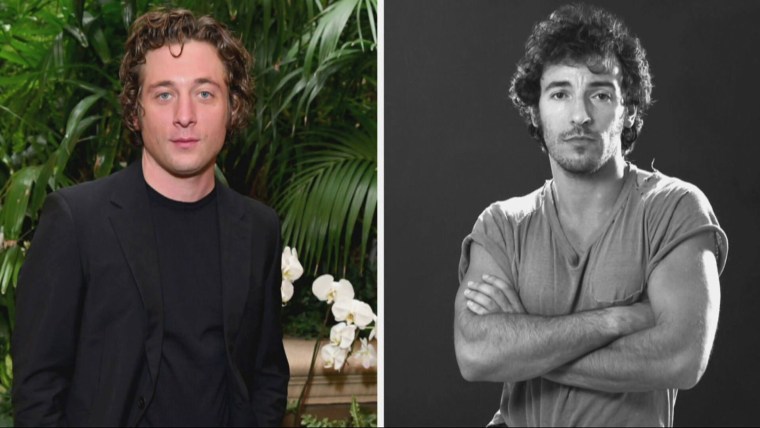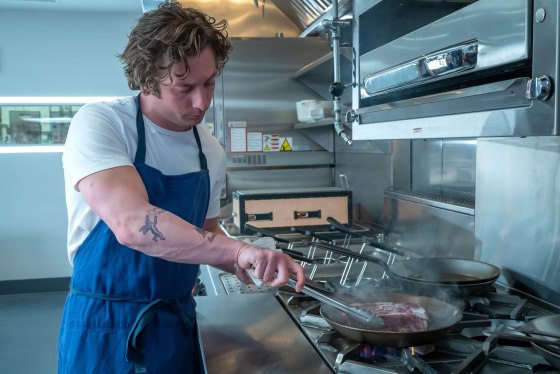How high are expectations for season three of “The Bear,” which drops Wednesday? Higher than the overhead on the nearly bankrupt restaurant around which the story revolves. Higher than the pill poppers and alcoholics who fry and bake in the show’s kitchens. Higher than the Chicago skyline that “The Bear” films so lovingly.
At its core, “The Bear” is a simple workplace drama. On closer inspection, though, it’s an ode to the psychic struggles of people thoroughly, hopelessly and self-destructively committed to their professions.
The basic plot of the critically acclaimed series is straightforward: An elite chef returns home to run the struggling sandwich shop of his brother who recently committed suicide (season one). He and his colorful back-of-house confreres endeavor to transform it into a Michelin-grade fine-dining establishment (season two). With season three upon us, we will soon discover whether chef Carmen (Jeremy Allen White) and his sous chef, Sydney (Ayo Edebiri), will earn their Michelin star. Or will they fall into complete financial and psychological ruin? Either scenario will surely intensify their subtly romantic and competitive dynamic.
“The Bear” speaks to all those afflicted by their own talent, trapped in their chosen vocations.
The series holds a rare synergy between the ensemble cast, technical crew and the writers, which delivers an artful meditation on passionate devotion to one’s craft and the work/life imbalance it demands.
To this end, the show’s talented actors perform virtuosic “two-handers,” lengthy dialogue-driven sequences in which the characters reflect on their love and hate of professional cooking. Then there is the inventive cinematography — the show’s secret special sauce. “The Bear” is legendary for its seizure-inducing scenes of kitchen chaos.
Its cameras, however, are as likely to sit still and post up tightly on its actors’ faces. So tightly that you can see the shades of periwinkle in Carmen’s eyes or the parting pattern of Sydney’s box braids. This “close-up” technique may be considered dépassé, but it brings us face to face with the characters’ pores, eliciting a vulnerability that may account for why so many of us watch these episodes on the verge of tears.
To my mind, the show’s greatest appeal lies in the way it approaches a paradox its viewership most likely knows well. Yes, the work we love to do sustains us. But, simultaneously, that toil immiserates and consumes us (and makes roadkill of our loved ones in the process). “The Bear” speaks to all those afflicted by their own talent, trapped in their chosen vocations — and this could be anyone, from a nurse to a sound engineer to an investigative journalist.
The chefs swallow Tums and Lansoprazole, chug Pepto-Bismol, succumb to nausea (after tasting their own recipes) and, climactically, vomit. Food is often filmed with an almost vegan revulsion — notice the unctuous fish and slabs of steaming meat. All labors of love, we are reminded, are kind of sickening. (And kind of inescapable, because, after all, we do love that labor.)
Aware of this paradox, Carmen tells Marcus (Lionel Boyce), his pastry chef, about the time he nearly set his old restaurant ablaze. “You’re watching the fire,” reflects Carmy, “and you’re thinking, ‘If I don’t do anything, this place will burn down and all my anxiety will go away with it.’” The cooks acknowledge how pleasing the release of all that anxiety would be. Then, both conclude the proper course of action is to “put the fire out.”

Edebiri’s character, Sydney, is as unflappable and chill as a subzero freezer (until she does something insane, like un-accidentally stabbing an obnoxious co-worker in the ass with a kitchen knife). Sydney’s commitment to craft means that she: 1) creates sublime risotto and omelets and 2) is so underpaid she still lives with her dad. Edebiri herself once commented on the downside of actors’ devotion to their vocation: “If you’re so consumed with making things, making things, making things, there’s no reserve in the well. There’s no real life in you.”
“The Bear” is short on solutions to the paradox of loving the labor that destroys you. Mercifully, it does not suggest that you achieve “work/life balance.” For artisans at least, that’s a dumb idea, a nonstarter and impossible to achieve anyhow. Rather, the series reminds us that within the paradox, within the chaos, there exists a sort of evenness, a predictable up and down.
The episodes, in form and content, reflect that balance. The frenetic camera is alternated with the still one mentioned above. The tense, bright-white surgical light of a world-class kitchen is contrasted against the soft morning sun leaking into the sandwich shop. The characters repeatedly tear into one another with lacerating, truly unforgivable insults, only to reconcile with warmth. In the hands of lesser writers, this recurring tension/release pattern would feel like cheap emotional whiplash.
The series reminds us that within the paradox, within the chaos, there exists a sort of evenness, a predictable up and down.
Then again, the show seems to suggest, maybe balance is best achieved by going to an AA meeting or praying to Our Lady of Victory.
Which returns us to the paradox. The series opened with a dream sequence in which Carmen gingerly (and inexplicably) approaches and tries to soothe an agitated caged bear, situated on a bridge. As he shushes the beast, he cautiously releases it from its enclosure. The bear charges Carmy with clear intent to maul.
Who’s the bear? There’s Carmen “the Bear” Berzatto. There’s the restaurant that bears (yes) his name. Then there’s Claire, Carmen’s kind and accomplished girlfriend (played by Molly Gordon), often referred to as “Claire Bear.” Uh-oh.
When we last saw Carmen in the season two finale, he was locked in a freezer. While enclosed, he inadvertently confessed aloud to Claire that he didn’t want to provide or receive “any amusement or enjoyment.” Claire was the roadkill in this situation. Our chilled chef, for his part, was at peace with the paradox that sustained him. That same paradox, in turns, sustains the series itself.

